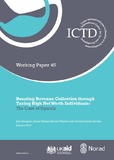| dc.contributor.author | Kangave, Jalia | |
| dc.contributor.author | Nakato, Susan | |
| dc.contributor.author | Waiswa, Ronald | |
| dc.contributor.author | Zzimbe, Patrick Lumala | |
| dc.coverage.spatial | Uganda | en |
| dc.date.accessioned | 2016-04-11T14:52:46Z | |
| dc.date.available | 2016-04-11T14:52:46Z | |
| dc.date.issued | 2016-01 | |
| dc.identifier.citation | Kangave, J. et al., (2016) Boosting Revenue Collection through Taxing High Net Worth Individuals: The Case of Uganda. ICTD Working Paper 45. Brighton: IDS | en |
| dc.identifier.isbn | 978-1-78118-285-7 | |
| dc.identifier.uri | https://opendocs.ids.ac.uk/opendocs/handle/20.500.12413/11205 | |
| dc.description | economic elites; exchange of information; gross domestic product; High Net Worth Individuals; tax administration; Uganda Revenue Authority. | en |
| dc.description.abstract | For over a decade Uganda’s tax-to-GDP ratio hovered between 12 per cent and 13 per cent, despite various amendments to tax laws and reforms in tax administration. Part of the low revenue contribution can be attributed to factors external to the Uganda Revenue Authority (URA), such as the structure of the economy – particularly the prevalence of the informal sector and the ubiquity of cash transactions. Another explanation is that poor revenue collection is a result of factors internal to the URA. One of these factors is that the URA’s enforcement efforts have concentrated on taxing corporate entities at the expense of individuals. With the exception of employees, very few individuals comply with their tax obligations outside those incurred at points of importation. Specifically, many wealthy individuals in the private and public sector either do not pay taxes or grossly under-declare their income. The consequence is that very little tax is being collected from this category of taxpayers.
This paper explores the potential for increasing tax revenue by taxing High Net Worth Individuals (HNWIs) through various lenses, including examining the legislative and administrative framework governing the taxation of individuals, collaborative efforts between the URA and other government agencies to improve tax administration, and mechanisms in place to support the sharing of taxpayer information both within the URA and with third parties. We highlight the strengths and weaknesses in the legal and administrative frameworks, with the underlying aim of designing an approach for taxing HNWIs. This paper discusses the findings of phase one of a two-phase project. The second phase will conduct a comparative study on taxation of HNWIs in other jurisdictions, with the aim of developing guiding principles for taxing Uganda’s HNWIs. | en |
| dc.description.sponsorship | DfID, NORAD. | en |
| dc.language.iso | en | en |
| dc.publisher | Institute of Development Studies | en |
| dc.relation.ispartofseries | ICTD Working Paper;45 | |
| dc.rights | Boosting Revenue Collection through Taxing High Net Worth Individuals: the Case of Uganda
Jalia Kangave, Suzan Nakato, Ronald Waiswa and Patrick Lumala Zzimbe
ICTD Working Paper 45
First published by the Institute of Development Studies in January 2016
© Institute of Development Studies 2016
ISBN: 978-1-78118-285-7
A catalogue record for this publication is available from the British Library.
All rights reserved. Reproduction, copy, transmission, or translation of any part of this publication may
be made only under the following conditions:
- with the prior permission of the publisher; or
- with a licence from the Copyright Licensing Agency Ltd., 90 Tottenham Court Road, London W1P 9HE, UK,
or from another national licensing agency; or
- under the terms set out below.
This publication is copyright, but may be reproduced by any method without fee for teaching or nonprofit purposes, but not for resale. Formal permission is required for all such uses, but normally will be granted immediately. For copying in any other circumstances, or for reuse in other publications, or for translation or adaptation, prior written permission must be obtained from the publisher and a fee may be payable.
Available from:
The International Centre for Tax and Development
at the Institute of Development Studies Brighton BN1 9RE, UK
Tel: +44 (0) 1273 606261 Fax: +44 (0) 1273 621202
E-mail: info@ictd.ac.uk
Web: www.ictd/en/publications
IDS is a charitable company limited by guarantee and registered in England (No. 877338) | en |
| dc.rights.uri | http://www.ids.ac.uk/files/dmfile/IDSOpenDocsStandardTermsOfUse.pdf | en |
| dc.subject | Economic Development | en |
| dc.title | Boosting Revenue Collection through Taxing High Net Worth Individuals: The Case of Uganda | en |
| dc.type | IDS Working Paper | en |
| dc.rights.holder | © Institute of Development Studies | en |

